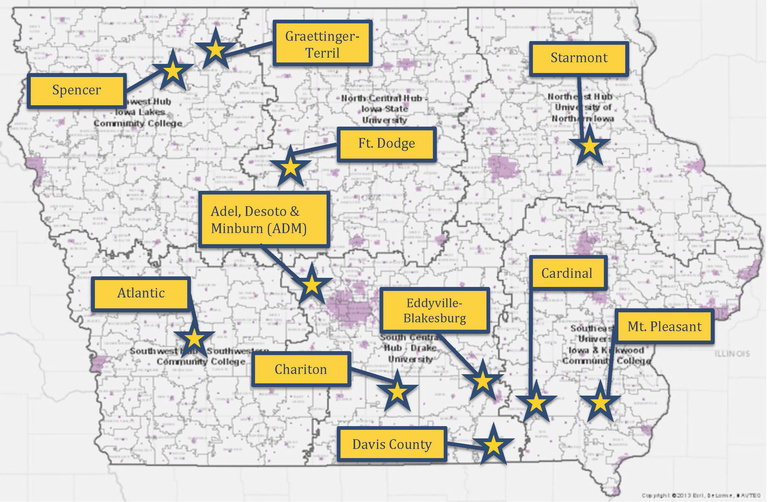Eleven rural school districts across the state have been selected to participate in a rigorous extracurricular math and science enrichment program offered through the University of Iowa’s Belin-Blank Center for Gifted Education and Talent Development in the College of Education.
The three-year program is aimed at empowering high-ability, middle school students living in rural school districts across the state with challenging opportunities in science, technology, engineering, and mathematics (STEM).
The STEM Excellence and Leadership program will provide year-round programming for educators and an estimated 120 students per year and includes professional development, materials, services, stipends for participating educators, and other support. The program was made possible through a $500,000 Talent Development Award the UI’s Belin-Blank Center received from the Jack Kent Cooke Foundation, the nation’s largest scholarship foundation.
This program ensures that rural school districts in Iowa have the opportunity to provide rigorous courses in math and science, fostering the development of Iowa’s academic talent, especially in STEM.
By expanding mathematics and science curricula in participating school districts and enhancing teachers’ abilities to raise the academic rigor in their classrooms, STEM Excellence is expected to help close the achievement gap between rural students and their urban counterparts.
The program is designed to improve student outcomes in middle school STEM courses, prepare participants for success and boost their enrollment in Advanced Placement (AP) math and science courses in high school. Ultimately, STEM Excellence will prepare students academically and social-emotionally, for advanced coursework, which will prepare them for university life.
Schools selected to participate in this program:

- Adel-Desoto-Minburn Community School District – ADM Middle School
- Atlantic Community School District—Atlantic Middle School
- Cardinal Community School District—Cardinal Middle School
- Chariton Community School District—Chariton Middle School
- Davis County Community School District—Davis County Middle School
- Eddyville-Blakesburg-Fremont Community School District—Eddyville-Blakesburg-Fremont Junior/Senior High
- Fort Dodge Community School District—Fort Dodge Middle School
- Graettinger-Terril Community School District—Graettinger-Terril Middle School
- Mount Pleasant Community School District—Mount Pleasant Community Middle School
- Spencer Community Schools—Spencer Middle School
- Starmont Community School District—Starmont Middle School
The 11 selected schools are located across the state of Iowa, with at least one in each of the six regions of the Iowa Iowa Governor’s STEM Advisory Council.
For more information, visit the Belin-Blank Center website.